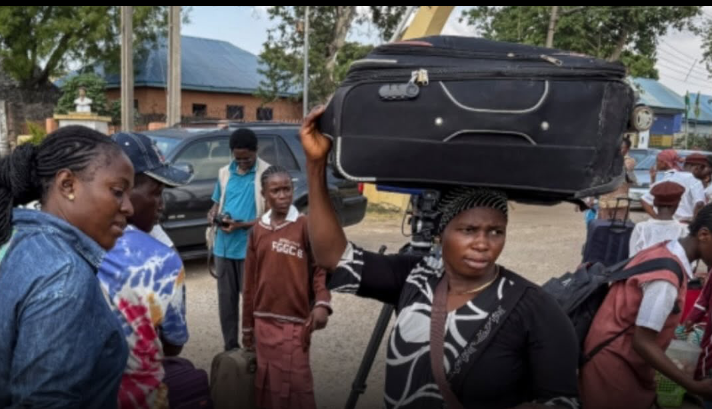

The atmosphere at the Federal Government Girls’ College (FGGC) Bwari turned tense and emotional on Saturday as hundreds of anxious parents arrived in droves to evacuate their children following rising security concerns in the outskirts of Abuja. By early morning, the usually calm school environment had transformed into a scene of urgency, with frantic movements, hurried conversations, and the unmistakable signs of a community gripped by fear.
Parents, some visibly shaken, were seen helping their daughters pack their belongings into cars, buses, and tricycles as the news of possible security threats spread quickly across the Federal Capital Territory. Students carrying schoolbags, mattresses, water containers, and boxes filled the walkways, many of them still dressed in their school uniforms and trying to maintain composure amid the worrying situation. Some pupils hugged their friends tightly, unsure of when they would return to school or what might happen next.
The mass evacuation followed a directive from the federal government on Friday ordering the immediate closure of 47 Federal Unity Colleges across the country. FGGC Bwari was among the schools listed for shutdown, a decision contained in a circular signed by Binta Abdulkadir, the Director of Senior Secondary Education. The circular emphasized that the closures were necessary “with immediate effect,” underscoring the gravity of the security concerns that prompted the move.
For many families, the directive felt sudden and unsettling. Parents said they received calls late Friday night from school administrators informing them to come for their children without delay. The abruptness of the instructions caused widespread confusion, and by Saturday morning, panic began to build as rumors circulated about threats in the surrounding area. Even though no confirmed attack had occurred on the school premises, the fear was enough to send families rushing to secure their loved ones.
At the school gate, traffic officers struggled to manage the growing crowd of cars attempting to enter and exit the compound. Engines revved, horns blared, and security personnel hurriedly checked vehicles as a sense of urgency swept through the premises. For most parents, their priority was simple—get the children out as quickly and safely as possible.
One mother, clutching her daughter’s hand tightly, said she barely slept after receiving the news. She arrived at the school before sunrise. “I couldn’t take any chances,” she explained breathlessly. “With the way things are going, you cannot wait until something happens. These are our children. Their lives come first.” Another parent, who drove from Minna immediately after hearing about the closure, said the decision by the government, though sudden, was necessary. “It is better they send them home than leave them here vulnerable,” he said.
Students themselves were caught between relief at going home and sadness over leaving their friends and school environment abruptly. Some girls fought back tears as they packed up, folding school uniforms into bags with shaky hands. Others tried to stay cheerful, helping their classmates gather their belongings while sharing light conversation in an attempt to ease the tension.
“I was in the dining hall when they told us to start packing,” a JSS2 student recounted. “Everyone was confused at first, but when we saw parents coming in large numbers this morning, that was when we knew something serious was happening.” Another student described how teachers moved from dormitory to dormitory urging the girls to stay calm and cooperate with the evacuation process. “Our teachers were really trying to reassure us,” she said. “But we could see the worry on their faces too.”
School authorities worked round the clock to coordinate the evacuation in an orderly manner. Staff members assisted in identifying students, verifying parents and guardians, and ensuring that every child was properly accounted for before being released. While the process moved slowly due to the massive turnout, school officials reiterated that safety precautions were their highest priority.
The federal government’s decision to close nearly 50 unity schools has triggered widespread debate among education stakeholders. Many question the deteriorating security situation that has forced repeated school closures in various parts of the country, while others worry about the academic disruption the shutdown will cause—particularly for students preparing for examinations. But for now, most parents argue that no academic calendar is worth more than the safety of their children.
Residents of Bwari, a town that has experienced its share of security threats in recent years, say the fear is not unfounded. Parents expressed concerns over the broader state of insecurity in Nigeria and the vulnerability of schools, especially those in remote or semi-rural areas. Some parents said they hoped that the closure would give authorities the opportunity to reassess security measures in and around the school.
As vehicles continued to leave the premises carrying students and their luggage, the mood remained somber. Teachers waved at their students, offering brief reassurances, while parents made hurried calls to update relatives about their children’s safety. By midday, much of the compound had emptied, leaving behind an eerie calm and the unspoken realization that it may be a long time before things return to normal.
For many families, the events of the day served as a painful reminder of the growing insecurity that has engulfed parts of the country. The evacuation has once again raised questions about the safety of public schools and the government's ability to protect young learners. As the sun began to set, families were still on the road, traveling long distances back to their various states, hoping for better days when schools can resume without fear.
In the meantime, FGGC Bwari, like many other unity schools now under temporary closure, stands as a symbol of the urgent need for improved security and strategic intervention. While parents express gratitude that their children are home safe, they also voice a deep desire for lasting solutions that will allow schools to operate without constant threats.
As night falls over Bwari, the gates of the once-bustling school remain closed—a stark reminder of a nation still grappling with insecurity and the heavy toll it continues to take on education, family life, and the very future of young Nigerians.


